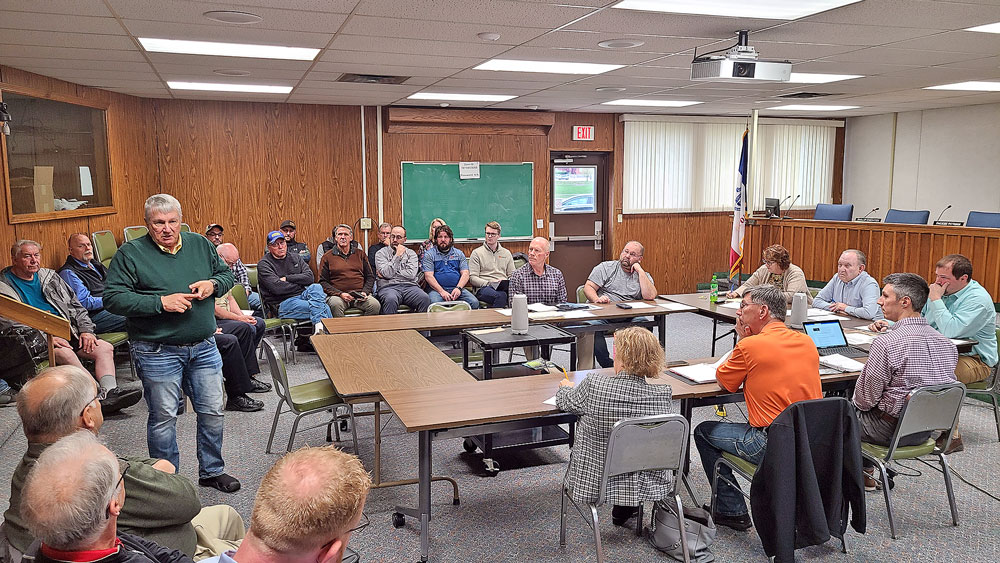Floyd County boards will begin pipeline ordinance discussion at Tuesday night meeting

By Bob Steenson, bsteenson@charlescitypress.com
The Floyd County Zoning Commission and the Floyd County Board of Adjustment will have their first public discussions Tuesday evening regarding a proposed zoning ordinance that would regulate hazardous liquid pipelines in the county.
The public meeting will be held at 5:30 p.m. Tuesday, June 13, at the Youth Enrichment Center at the Floyd County Fairgrounds. The meeting is being planned as a workshop meeting for the groups, with no action to be taken.
According to the agenda, 20 minutes will be allotted to attorney Tim Whipple, of Ahlers & Cooney law firm in Des Moines, who the county Board of Supervisors hired to represent the county regarding two carbon dioxide capture and sequestration projects proposed to construct pipelines in the county.
Whipple worked with Supervisor Chair Mark Kuhn to develop the proposed pipeline ordinance for Floyd County, as Whipple has done with several other counties in the state that have proposed pipeline routes going through them.
Following Whipple’s presentation, 10-minute presentations will be allowed by representatives of the two pipeline projects – Summit Carbon Solutions and Navigator CO2 Ventures.
Both companies are proposing to build transportation pipelines through Iowa and several other Midwest states – and including through Floyd County – to collect carbon dioxide from ethanol and other CO2-producing facilities, pressurize it into a liquid, then transport it to sites in Illinois (Navigator) or North Dakota (Summit) where it would be injected deep underground for permanent storage.
Public input to the county boards, Whipple or the pipeline project representatives will also be allowed at the meeting, and the boards are accepting written comments from the public before the meeting, that will be presented at the meeting.
People wishing to submit written comments should send them along with their name and address before the meeting to JSherman@floydcoia.org or to JSolomon@floydcoia.org.
The proposed hazardous liquid pipeline ordinance has caused some friction between the chair of the Board of Supervisors, Mark Kuhn, and the chair of the Zoning Commission, Dean Tjaden – not necessarily yet because of the content of the proposal, but by the perceived different levels of urgency with which each of them is approaching it.
Kuhn has accused Tjaden of “slow-walking” the proposed ordinance since it was first available April 7, and Tjaden said it has taken a while to find a time when all the members of his commission and the members of the county Board of Adjustment are available.
Among the things the ordinance would do is establish set-back limits for where a hazardous liquid pipeline can be located in relation to other objects or sites. They are:
- Not less than one mile from the city limits of an incorporated city.
- Not less than half a mile from a church, school, nursing home, long-term care facility, hospital, public park, conservation area, sensitive area, public recreation area, Floyd County Fairgrounds or any occupied structure.
- Not less than 2,000 feet from any animal feeding operation or facility.
- Not less than 1,000 feet from an electric power generating facility, an electric transmission substation, a public drinking water treatment plant, or a public wastewater treatment plant.
- Not less than 200 feet from any public water system or any nonpublic water supply well or private well.
The ordinance would also require sophisticated plume modeling showing where the contents of a pipeline might spread if there is a leak or a rupture, as well as various fees and permits.
After the Zoning Commission finishes its process, which will include at least one and possibly more additional meetings, it will make a recommendation on the ordinance to the Board of Supervisors. The supervisors do not have to follow the commission’s recommendation.
Tjaden invited the Board of Adjustment to be part of the discussion because some of the proposed procedures in the ordinance would involve that board.
Three other counties in the state – Emmet, Story and Shelby – have passed ordinances regulating where pipelines can be built. Each of them has been sued in federal court by Summit Carbon, with Summit arguing that only the state can regulate where pipelines are located and only the federal government can establish safety guidelines for pipelines.
Each of the counties is being represented by Ahlers & Cooney. The Story County suit is the furthest along, with a trial date set for Dec. 11 this year. Trial in the Shelby County case is set to begin Jan. 16, 2024. No trial date has been set in the Emmet County case.
In the Shelby County case, Summit moved for an injunction against the county ordinance taking effect, saying it would cause the company irreparable harm. A hearing on that motion was held March 31 in U.S. District Court for the Southern District of Iowa, but the judge has not yet filed a decision.








Social Share